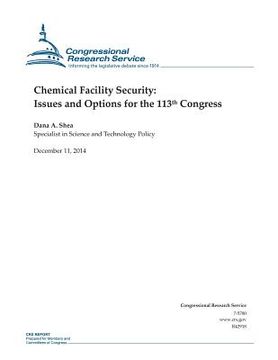Chemical Facility Security: Issues and Options for the 113th Congress (en Inglés)
Reseña del libro "Chemical Facility Security: Issues and Options for the 113th Congress (en Inglés)"
The Department of Homeland Security (DHS) has statutory authority to regulate chemical facilities for security purposes. The 113th Congress extended this authority through December 11, 2014. Congressional policy makers have debated the scope and details of reauthorization and continue to consider establishing an authority with longer duration. Some Members of Congress support an extension, either short- or long-term, of the existing authority. Other Members call for revision and more extensive codification of chemical facility security regulatory provisions. Questions regarding the current law's effectiveness in reducing chemical facility risk and the sufficiency of federal chemical facility security efforts exacerbate the tension between continuing current policies and changing the statutory authority. Congressional policy makers have questioned DHS's effectiveness in implementing the authorized regulations, called chemical facility anti-terrorism standards (CFATS). The DHS finalized CFATS regulations in 2007. Since then, the site security plans for 900 chemical facilities have been approved in the CFATS process, which starts with information submission by chemical facilities and finishes with inspection and approval of facility security measures by DHS. Additionally, DHS has inspected some facilities for subsequent compliance activities. Several factors, including the amount of detailed information provided to DHS, the effectiveness of DHS program management, and the availability of CFATS inspectors, likely complicate the inspection process and lead to delays in inspection. Policy makers have questioned whether the compliance rate with CFATS is sufficient to mitigate this homeland security risk. For additional analysis of CFATS implementation, see CRS Report R43346, Implementation of Chemical Facility Anti-Terrorism Standards (CFATS): Issues for Congress. Key policy issues debated in previous Congresses contribute to the current reauthorization debate. These issues include the adequacy of DHS resources and efforts; the appropriateness and scope of federal preemption of state chemical facility security activities; the availability of information for public comment, potential litigation, and congressional oversight; the range of chemical facilities identified by DHS; and the ability of inherently safer technologies to achieve security goals. The 113th Congress might take various approaches to this issue. Congress might allow the statutory authority to expire but continue providing appropriations to administer the regulations. Congress might permanently or temporarily extend the statutory authority to observe the impact of the current regulations and, if necessary, address any perceived weaknesses at a later date. Congress might codify the existing regulations in statute and reduce the discretion available to the Secretary of Homeland Security to change the current regulatory framework. Alternatively, Congress might substantively change the current regulation's implementation, scope, or impact by amending the existing statute or creating a new one. Finally, Congress might choose to terminate the program by allowing its authority to lapse and removing funding for the program. This would leave regulation of chemical facility security to state and local governments. The House has passed H.R. 4007, and the Senate has passed an amended version of H.R. 4007. Both versions would establish a CFATS program within DHS, but each has unique provisions. In addition, both the House and Senate homeland security appropriations acts would extend the duration of the statutory authority until October 4, 2015.

